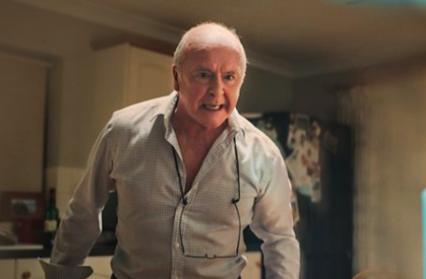Joshua Ludewig reviews BBC 4’s Theatre to TV adaptation of Isla, a dark comedy about an elderly man’s relationship with a digital assistant, making its TV debut following a world premiere at Theatr Clwyd.
Isla has been making waves in theatrical circles since it premiered at Theatr Clwyd in North Wales. Here, Tamara Harvey reprises her role as the play’s artistic director taking on the TV adaptation, too. Isla follows retired teacher, Roger (Mark Lambert), coming to terms with life without his wife during the height of the lockdown in Wales. Roger, like so many of us at the time, suspects that the lockdown will only last a mere three weeks (ah… the optimism!), but Erin (Lisa Zhara), Roger’s caring yet largely absent daughter, has doubts. Not wanting her dad to be alone during this time, she buys him an ‘Isla’, a virtual assistant – or “digital slave”, as she explains it – similar to Amazon’s Alexa. Roger finds the idea of “talking to a box” confounding and insists he’ll “never use it!”.
Erin and Roger’s exchanges provide some of the best comic moments in Isla, and it’s hard not to wish the two had more screen time together. Erin’s frustrated witty remarks, in retort to Roger’s stubborn refusal to change his daily routine, result in some self-validating grins for viewers who have had similar conversations with their own parents. But Price’s writing is not only humorous, it also positions the characters through a lens of heightened familiarity, the dialogue highly accurate in its portrayal of modern parent-child relationships.
Later, we see Roger’s initial reluctance begin to fade away, as his comfort grows he begins to joke with Isla, quipping: “Isla, what are you wearing?”. It’s a throwaway remark, but one full of portent of what’s to come. The signs, it seems, are there from the beginning. Starting to confide in Isla, Roger shares memories of his wife, his worries, and his frustrations. This series of vulnerable monologues might have been more impactful if not for his immersion-breaking stare directly to camera, direction which seems leftover from the show’s theatrical origins. This scene raises some interesting yet poignant thoughts about the role of digital assistants in our lives. While they may be able to alleviate some feelings of loneliness, they are no replacement for human interaction. The fact Roger seems to only be able to open up to Isla is, in itself, revealing – highlighting a lack of intergenerational discourse. The relationship between Isla and Roger, however, slowly begins to sour. The latter beginning to use gendered slurs in his interactions with the female-voiced digital assistant. Lambert’s performance subtly excavates a sense of deep-seated anger, each slur spoken with increasing aggression and intensity. Skilful acting and direction combine to make for truly uncomfortable viewing – a real time perversion of the once seemingly endearing older man.
Things worsen as Roger’s sexist verbal abuse towards Isla elicits real-world consequences for Erin and her family. Price once again challenges us with questions around language, intention, and generational divides. It raises questions about the state of ingrained bias with digital assistants, who are given female voices by default, and the way they reinforce ideals relating to subservience and powerlessness. It’s a discourse which continues with the introduction of Catrin Aaron, who gives a stand-out performance as Police Officer Jones, tasked with presenting a condescending community outreach lecture. Handled less deftly, the interactions between Roger and PC Jones may have come over preachy with the emphasis placed on gender equality and freedom of expression, yet it is Aaron’s disdainful and jaded deliverance which brings a welcome satirical tone – creating an ironic reversal in stereotypical gender roles.
Ultimately, Roger’s frustration only increases as time goes on. He becomes more estranged and isolated from the world than ever – the distance cemented by the pandemic and loss of his wife. These frustrations yet again culminate in abuse, except now Isla’s recently installed alarm blares. In a panic, Roger destroys Isla, a symbolic and literal climax of his mounting frustration and rage. Erin, alerted by the alarm, enters to discover Roger in the aftermath of his destruction. It concludes as a tender moment between the pair, a barrier between then removed as they embrace. The connection here is palpable, a testament to Harvey’s skills as a director, given the short amount of screen time the two actually share. Isla is far from the first story to explore technology’s intrinsic and sometimes damaging role in modern day human connection, but it does offer freshness via its focus on the distance which can be widened by tech use in intergenerational relationships. A dynamic, interesting watch – delivering laughs and tears, Isla puts both hope and horror on offer, with a few laughs along the way.
Isla is available to watch now on BBC 4.












